With no money available this legislative session because of diminishing oil and gas tax revenues and a sense of an ethical crisis, a number of pieces of legislation calling for reform have been introduced.
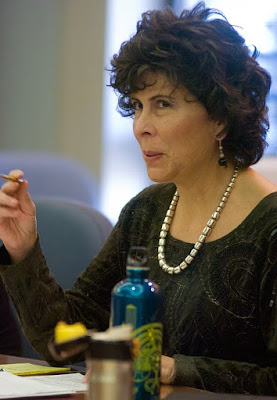 This is Senator Linda Lopez, D, Bernalillo County.
This is Senator Linda Lopez, D, Bernalillo County.Her district 11 runs from the Rio Grande on the east, to the Rio Puerco on the west, and from Central Avenue and Interstate Highway 40 on the north to the Isleta Pueblo boundary, on the south; with a few cut out here and there. Senate district 11 abuts with districts: 12, Sen. Gerald Ortiz y Pino, 14, Sen. , 22, Sen. Lynda Lovejoy, 23, Sen. Sander Rue, and 26, Sen. Bernadette Sanchez. All the districts are wholly or partially within Bernalillo County, except 22, which contains parts of Cibola, McKinley, Rio Arriba, and Sandoval Counties, 23, which contains part of Sandoval County and 14, which contains parts of Valencia County. All of the Senators from abutting districts are Democrats, except Rue, who is a Republican.
Lopez Chair’s the Senate Rules committee. The committee is considered to be rather powerful and if one looks at its make up, you can understand why.

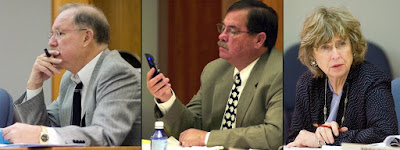 There are five Democrats; Lopez, Vice Chair Peter Wirth, Santa Fe County, Majority Floor Leader Michael Sanchez, Valencia County, President Pro Tem Timothy Jennings, Chaves, Eddy, Lincoln and Otero Counties, and Dede Feldman, Bernalillo County.
There are five Democrats; Lopez, Vice Chair Peter Wirth, Santa Fe County, Majority Floor Leader Michael Sanchez, Valencia County, President Pro Tem Timothy Jennings, Chaves, Eddy, Lincoln and Otero Counties, and Dede Feldman, Bernalillo County.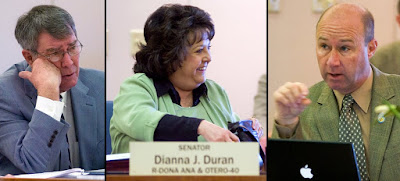 On the Republican side: Minority Leader Stuart Ingle, Chaves, Curry, De Baca and Roosevelt Counties, and Dianna Duran, Dona Ana and Otero Counties, and Ranking Member Kent Cravens, Bernalillo and Sandoval Counties.
On the Republican side: Minority Leader Stuart Ingle, Chaves, Curry, De Baca and Roosevelt Counties, and Dianna Duran, Dona Ana and Otero Counties, and Ranking Member Kent Cravens, Bernalillo and Sandoval Counties.So what’s wrong with this picture?
All Senate Ethics bills started in the Rules committee. To the casual observer, the bills are bottlenecked. It is true that the Rules committee did not meet until early February, but the committee has a preexisting policy of not reporting out multiple bills on the same topic.
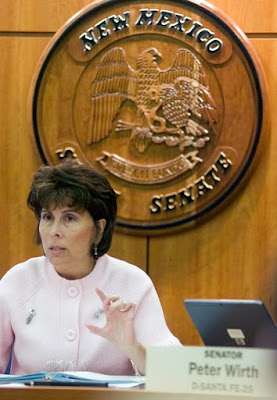 Lopez explained in a quiet, logical manner, the reasons why the Rules committee has adopted such a policy. She said multiple bills confuse legislators who tend to vote against them. The policy requires the sponsors of competing bills to work together to create a committee substitute.
Lopez explained in a quiet, logical manner, the reasons why the Rules committee has adopted such a policy. She said multiple bills confuse legislators who tend to vote against them. The policy requires the sponsors of competing bills to work together to create a committee substitute.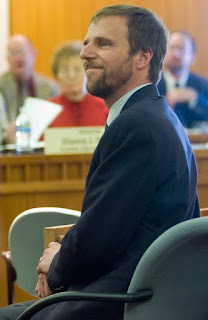 Several activists, lobbyists and bill watchers are openly complaining that Lopez is obstructing the committee process while the bills are being reworked into substitutes.
Several activists, lobbyists and bill watchers are openly complaining that Lopez is obstructing the committee process while the bills are being reworked into substitutes.Common Cause’s Executive Director Steven Robert Allen’s, right, position is that because New Mexico is one of a very few states that does not have campaign contribution limits; the legislature should not have to reinvent the wheel. There are plenty of models, some court tested, which can be readily adopted.
Democracy for New Mexico’s Barbara Wold, and Heath Haussamen on New Mexico Politics, based their comments, in part, after watching the video provided by the New Mexico Independent's Gwyneth Doland.
Doland has joined the glacier chorus.
One of the complaints was based on an extended debate Feb 25, on an “advice and consent of the Senate,” in the confirmation process of a reappointment to the Fish and Game Board. Ethics activists awaiting their bills became more than slightly irritated over the half-hour discussion of antelope hunting enforcement practices.
"I hope it becomes clear to many how much purposeful time wasting goes on in the committee," Wold wrote on the NMI transcript. "Who knew that antelope management was on the front burner(?)"
One may remember that antelope were a hot topic earlier in the year. Each piece of legislation is due its own proper hearing before the committees.
 Analysis
AnalysisReview
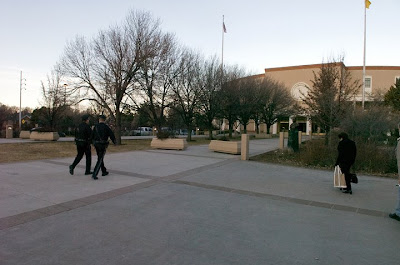 New Mexico’s legislature was designed by our State’s Constitution to follow the Federal Constitution’s model of a House and Senate.
New Mexico’s legislature was designed by our State’s Constitution to follow the Federal Constitution’s model of a House and Senate.The House is meant to be closest to the people and is therefore very reactive. The House is the larger body, with fewer constituents and each Representative is elected every two years.
The Senate is considered the deliberative body. In the Federal system, two Senators represent each State. The thinking within the Federalist system was to allow each state an equal voice. Senators were appointed by the states, but a Constitutional amendment changed that to allowing the people to directly elect them. They serve a six-year term on staggered cycles. A third of the Senate is elected each Congressional election.
17th Amendment, Senators Elected by Popular Vote.
The Senate of the United States shall be composed of two Senators from each State, elected by the people thereof, for six years; and each Senator shall have one vote. The electors in each State shall have the qualifications requisite for electors of the most numerous branch of the State legislatures.It was ratified April 8, 1913.
When vacancies happen in the representation of any State in the Senate, the executive authority of such State shall issue writs of election to fill such vacancies: Provided, That the legislature of any State may empower the executive thereof to make temporary appointments until the people fill the vacancies by election as the legislature may direct.
This amendment shall not be so construed as to affect the election or term of any Senator chosen before it becomes valid as part of the Constitution.
Thomas Jefferson was in France when the Constitution was drafted. Upon his return, he asked fellow Virginian, George Washington, why a Senate? “We pour legislation into the senatorial saucer to cool it," Washington supposedly said.
In New Mexico’s legislature, Senators are elected every four years. At one point, half the Senate was elected every two years, but that was altered so they now are elected at the same time as the Presidential election.
 My Take
My TakeI’ve been pointing video and still cameras at the legislature this session. The first interest was to get the House to seriously consider webcasting. Rep. Janice Arnold Jones, R, Bernalillo County, has been covering the House Taxation and Revenue and the House Voters and Elections committee meetings.
 The House took steps to move towards webcasting their own meetings. The effort is limited and vigilance must be maintained to assure that the leadership, in spite of their rhetorical support, follows through.
The House took steps to move towards webcasting their own meetings. The effort is limited and vigilance must be maintained to assure that the leadership, in spite of their rhetorical support, follows through.Rep. Dennis Kintigh, Left, R, Chaves, Lincoln and Otero Counties, has this week, joined Arnold Jones in covering his assignments on the House Health and Government Affairs and House Judiciary committees.
My attention has turned to the Senate, which voted to reinstall the cameras in their chamber, but nothing has been streamed from there yet.
The Senate Rules Committee is our focus since they took up the ethics bills. With the assistance of Ched MacQuigg, of Diogenes' six, we have provided a live video feed to the New Mexico Independent several times.
 The ethics legislation has attracted a fair amount of media attention. The Santa Fe New Mexican's Photographer Luis Sanchez-Saturno, above left, and KUNM FM's Reporter Scott Ki covered the meetings. KUNM FM's News Director and Reporter Jim Williams, below left, records witness testimony, while Albuquerque Journal Staff Writer Jeff Jones reports on the proceedings.
The ethics legislation has attracted a fair amount of media attention. The Santa Fe New Mexican's Photographer Luis Sanchez-Saturno, above left, and KUNM FM's Reporter Scott Ki covered the meetings. KUNM FM's News Director and Reporter Jim Williams, below left, records witness testimony, while Albuquerque Journal Staff Writer Jeff Jones reports on the proceedings.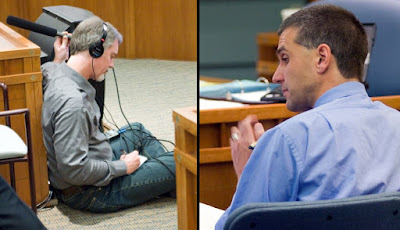 Wold wrote on her DFNM site, Feb. 25, in, NM Senate Rules Committee Continues Glacial Pace on Ethics Bills:
Wold wrote on her DFNM site, Feb. 25, in, NM Senate Rules Committee Continues Glacial Pace on Ethics Bills:I have to admit I find it all a bit embarrassing to witness. What I'm seeing -- live and shamelessly presented -- appears to be a circus act organized to placate big donors and the status quo power bloc. And the people be damned. It can't just be me, can it?Yes Barbara, it can be just you; and Stephen and Heath, and those others, who think that their particular interests, in their particular issue, is of vital importance to the exclusion of others. Maybe it’s why you shouldn’t watch sausage being made either. The political/legislative process is an ugly mess. It takes time, between being required to be on the floor, at other committee meetings, attending joint sessions to hear federal congressional delegation members speak, it’s hard to find the time to coordinate schedules and work out details. The negotiations are not always amicable. The issue differences are not always easily surrendered. It may take time and it may seem “glacial,” but it also may be moving at an appropriate pace.
Wold has been very hard on Sen. Lopez, as she carried a Tax Increment Development District bill that directly affects her district and future constituents.
To Wold, political demonizing has become standard fare. Lopez is not viewed as a Progressive, by Progressives and is not always regarded highly by other Democrats. Lopez has a long history of being very independent.
In last Friday’s, Feb. 27, posting, Sen. Linda Lopez Continues Delays on Ethics Bills in NM Senate Rules Committee, Wold blamed Lopez for not bringing forward the ethics bills until four were raised late in the hearing.
Wold hasn’t always been so hard on Lopez. In a May 04, 2005, posting, she wrote: Senator Lopez Sheds Light on Repub Distortions.
Every piece of legislation, every appointee, every memorial, has its supporters and oft times, its detractors. Not every detractor is some “evil” special interest. There may only be a different viewpoint, opposite of a supporter’s or detractor’s own special interest.
Government workers lobby for their respective departments' or add information to the committee’s debate. They include Bureau of Elections Administrator Kelli Fulgenzi who spoke about the effect of campaign reporting requirements on the Secretary of State’s office.
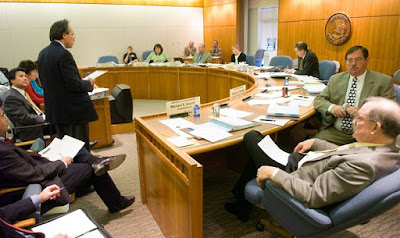 Chief Deputy Attorney General Stuart Bluestone, above left, addresses the committee about legal issues associated with the formation of an ethic commission.
Chief Deputy Attorney General Stuart Bluestone, above left, addresses the committee about legal issues associated with the formation of an ethic commission.Several ethics bills have cleared the Rules Committee:
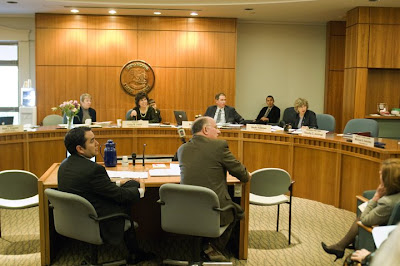 SB 94 and 163 sponsored by Mark Boitano, right, and Eric Griego, left, Prohibit Former Legislators as Lobbyists. At the initial hearing Griego indicated Boitano had stronger language and they would later prepare a substitute bill, which was passed out of Rules and is now awaiting a hearing at the Senate Judiciary Committee
SB 94 and 163 sponsored by Mark Boitano, right, and Eric Griego, left, Prohibit Former Legislators as Lobbyists. At the initial hearing Griego indicated Boitano had stronger language and they would later prepare a substitute bill, which was passed out of Rules and is now awaiting a hearing at the Senate Judiciary Committee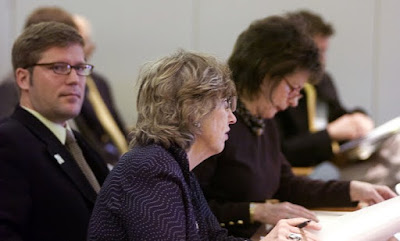 Sens. Timothy Keller, D, Bernalillo County, Feldman and Berffort Wilson presented bills that would prohibit contractors from making political contributions for up to two years prior to accepting any State work.
Sens. Timothy Keller, D, Bernalillo County, Feldman and Berffort Wilson presented bills that would prohibit contractors from making political contributions for up to two years prior to accepting any State work. Former Sen. H. Diane Snyder, R, Bernalillo County, is now, and has been Executive Director of the American Council of Engineering Companies-New Mexico. Snyder said that part of her duties is governmental relations and that as a citizen legislator, she had to make a living. Her presence was not something that came from her having served, but her service had come from her professional work.
Former Sen. H. Diane Snyder, R, Bernalillo County, is now, and has been Executive Director of the American Council of Engineering Companies-New Mexico. Snyder said that part of her duties is governmental relations and that as a citizen legislator, she had to make a living. Her presence was not something that came from her having served, but her service had come from her professional work.She took offense with the bills tone that contractors, contributors, and lobbyists were somehow bad people.
Snyder said that members of her association were being continually strong armed to make campaign contributions, sponsor public or charitable events; such as hosting seminars, workshops and retreats. They just want to know the rules, that they are written down, so they don't break the law.
 SB 261 Retirement Benefit Forfeiture for some Crimes, sponsored by Sen. Sue Wilson Beffort, left, R, Bernalillo, Sandoval, Santa Fe and Torrance Counties, was passed out of Rules and is awaiting hearing at the Senate Judiciary Committee.
SB 261 Retirement Benefit Forfeiture for some Crimes, sponsored by Sen. Sue Wilson Beffort, left, R, Bernalillo, Sandoval, Santa Fe and Torrance Counties, was passed out of Rules and is awaiting hearing at the Senate Judiciary Committee.SB 128 to Require Biannual Campaign Reports, sponsored by Sen. Peter Wirth passed the full Senate, 37-3, with two Senators excused; Cynthia Nava and Mary Jane Garcia, both Democrats from Dona Ana County. Senators Carroll Leavell, R, Eddy and Lea Counties, Richard Martinez, D. Los Alamos, Rio Arriba and Santa Fe Counties, and Michael Sanchez voted against the bill. It is now before the House Consumer and Public Affairs Committee.
Four bills, individually sponsored by Senators: Feldman, Wilson Beffort, Bernadette Sanchez and Wirth, addressing the issues of limiting the amounts of political contributions from individuals or groups to candidates, campaigns, and political action committees. Each specifically requires the donor to be named, even if the money goes through a third party. The bills were consolidated into committee substitute 116 and reported out of Rules, today with a do-pass recommendation.
Most, if not all the other pending ethics bills had a first hearing. Those bills, that either have the same name or address the same issues, have been relegated to the committee substitute process and some apparently are coming back for additional debate.
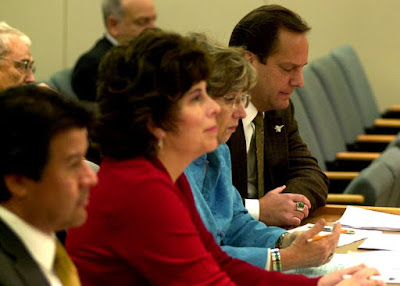 There are four Senators sponsoring individual bills that all address a State Ethics Commission. They are: Sens. Lopez, Feldman, Pete Campos, D, Guadalupe, Mora, San Miguel, Santa Fe, and Torrance Counties, and John Ryan, R, Bernalillo and Sandoval Counties.
There are four Senators sponsoring individual bills that all address a State Ethics Commission. They are: Sens. Lopez, Feldman, Pete Campos, D, Guadalupe, Mora, San Miguel, Santa Fe, and Torrance Counties, and John Ryan, R, Bernalillo and Sandoval Counties.There are some major differences amongst these proposals, especially in the number and manner of selection for commissioners. There is also wide latitude in just how broad an ethics commission’s reach should be. Some argue it should be limited to the elected members of the three branches of government: the executive, legislative and judicial. Others propose that it apply down to County Commissioners, while others believe it should be all encompassing; including all public employees and any contractors who are working on government projects. There was a discussion that might lead to the term of art, “and all political sub-divisions.”
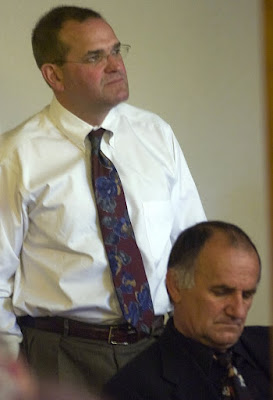 Executive Director and General Counsel for the New Mexico Judicial Standards Commission Jim Noel, above, pointed out that the legislature is barred form creating an ethics commission for judges. The State Constitution’s Article VI, Judicial Department, Section 32, Judicial standards commission, was adopted by a voter approved amendment November 7, 1967, and updated several times. If the legislature wants to include judges in a new process, they must do so by amending the Constitution.
Executive Director and General Counsel for the New Mexico Judicial Standards Commission Jim Noel, above, pointed out that the legislature is barred form creating an ethics commission for judges. The State Constitution’s Article VI, Judicial Department, Section 32, Judicial standards commission, was adopted by a voter approved amendment November 7, 1967, and updated several times. If the legislature wants to include judges in a new process, they must do so by amending the Constitution. SB 693 Prohibiting Certain Contributions and Solicitations of Contributions by Business Entities and Lobbyists and the Principals of State Contractors sponsored by Sen. Eric Griego, above left, with Common Causes' Allen is still pending.
SB 693 Prohibiting Certain Contributions and Solicitations of Contributions by Business Entities and Lobbyists and the Principals of State Contractors sponsored by Sen. Eric Griego, above left, with Common Causes' Allen is still pending.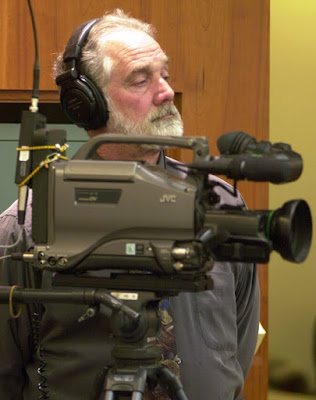 MacQuigg has taken his own view of the back and forth of the bureaucratic political gamesmanship over the problem of a window with its overpowering sunlight streaming through it into the Rules Committee room.
MacQuigg has taken his own view of the back and forth of the bureaucratic political gamesmanship over the problem of a window with its overpowering sunlight streaming through it into the Rules Committee room. It wasn't until about mid way through the third day of our webcasting efforts that Rules Committee Analyst Matt Baca, left, inquired about the window blinds' adjustment. He fixed the the window.
It wasn't until about mid way through the third day of our webcasting efforts that Rules Committee Analyst Matt Baca, left, inquired about the window blinds' adjustment. He fixed the the window. MacQuigg also has a comment about how hard it is to get up at 4:30 am to catch the 5:30 RailRunner train to be set up for the scheduled 8:00 committee meeting.
MacQuigg also has a comment about how hard it is to get up at 4:30 am to catch the 5:30 RailRunner train to be set up for the scheduled 8:00 committee meeting. Though he may have closed his eyes momentarily, I sat on the floor, at the back of the room, during a non-ethics related debate and took a quick nap. I opened my eyes and saw Daniel Ivey-Soto, above, who is lobbying for County Clerks on election issues, pointing his cellular phone’s camera in my direction. He has been kind enough not to put it on the internet.
Though he may have closed his eyes momentarily, I sat on the floor, at the back of the room, during a non-ethics related debate and took a quick nap. I opened my eyes and saw Daniel Ivey-Soto, above, who is lobbying for County Clerks on election issues, pointing his cellular phone’s camera in my direction. He has been kind enough not to put it on the internet. As I see it, casting light on the legislative process is a good thing, but competing with the bright sunlight can cause problems photographically. This is Sen. Cravens, left, talks on his cellular phone silhouetted before the committee room's window.
As I see it, casting light on the legislative process is a good thing, but competing with the bright sunlight can cause problems photographically. This is Sen. Cravens, left, talks on his cellular phone silhouetted before the committee room's window.Lopez has the power to move these bills forward, but my sense is she rather get good legislation rather than hurried junk. There is adequate time to accomplish the passing of meaningful ethics reform.
1 comment:
Thanks for all the links to my posts. My appreciation also goes out to you and Chedd for the video and other coverage at the Legislature. I know it's hard work. You two do it quite well.
That said, I want to quibble with your statement about those "who think that their particular interests, in their particular issue, is of vital importance to the exclusion of others."
Ethics and campaign finance reform measures are very much the interests of the majority of New Mexicans who have seen the corrosive effects of big money in the Legislature and beyond. Such measures have been considered carefully by two task forces whose members are highly respected and knowledgeable about the issues involved. Twice, excellent and well thought out recommendations emerged from the task forces.
Moreover, ethics and campaign finance bills very similar to those being considered today have been introduced in the Legislature since 2007. These are not new proposals and the arguments have been made on both sides many times over.
I find it hard to believe that you sincerely believe a rambling and mostly irrelevant monologue about antelope herds by Sen. Jennings in Senate Rules was worthwhile at a time when the public is hungering for action on the ethics bills awaiting debates on their merits. As anyone who follows the legislature knows, Sen. Jennings is famous for these time-wasting dissertations that function to help keep discussions about bills he doesn't like at bay.
I am also well aware of the differences between the Senate and House, and that the Senate is set up to be a much more deliberative body. My beef is that I'm not hearing enough reasoned debates about the important issues in the Rules Committee and elsewhere. I'm too often hearing overly long deliberations about antelope herds and other minutia.
I also object to your view that I "demonize" legislators when I point out what they are doing and speculate, based upon any number of considerations and facts, on why they are doing what they are doing.
If you're looking for some demonization and fact bending to criticize, I suggest you consider the long-running and often fact-challenged attacks on ethics and campaign reform measures and those who advocate on their behalf that are tossed out by Joe Monahan and his anonymous "alligators."
Old Joe has been gleefully trumpeting his approval of keeping the status quo money games and entrenched power blocs in place for many moons. And he has often used slurs and innuendo to do so. At least be fair when you're engaged in what could be seen by some as "demonizing" at least one blogger.
Post a Comment